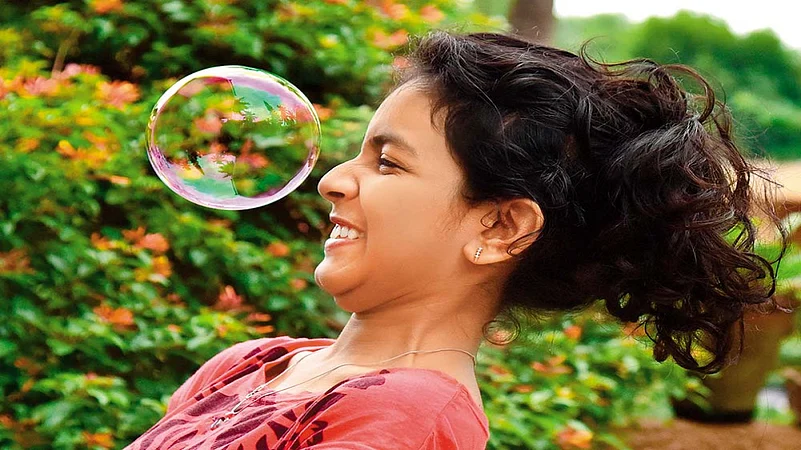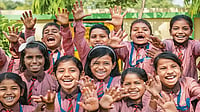Perpetual war. A state where you lose focus, lose grip on the flow of time, its diurnal and seasonal rhythms, even a healthy sense of the self-in-the-world. That’s what the pandemic appears like even to adult minds—a social desert, a psychological dead-end from which flight seems impossible. Transpose that state to a child’s mind and imagine the intensity of the crisis. The world has imposed on them, without any warning, a life bereft of most of our normal markers of comfort and delight—a life that could be deemed normal only for ancient warriors or modern army units specialised in remote border conflicts. Time hangs like a vast, empty space, with nothing filling it—we are well into the second year now, and no signs of early closure appear on the horizon. And remember, a young mind cognizes and processes a year as being of a much, much longer duration. Are you surprised at signs of fatigue, mental attrition and depression creeping in? The familiar hum of school, the laughter of classmates, would now be a distant memory for the really younger ones. How to comport oneself in group situations is something you have to learn by doing—the chance for that normal behavioural evolution is snuffed out. ‘The outdoor’ is taboo—with it goes the tactile connection with the planet.
The years of early childhood, up to age 8, are crucially formative. It is precisely through interactions with the world that the young body-mind continuum evolves physically, cognitively and socio-emotionally, internalising the complex structures of language right from infancy and then honing those skills in the playground and school. Home is the fulcrum of their lives—and luckily, that is still with them, at least most of them. But the outside ‘environment’ is the foundry where a well-formed, complete human being is forged. That has simply vanished, as it were.
At Reckitt, we are keenly alive to this form of deprivation. That’s why children are always at the centre of our campaigns, advertisements and CSR activities. In our journey of over five years where we focused on the very young, we started small but now our reach extends to over 6 lakh schools. What makes us really proud is that our efforts are not disproportionately focused on private urban schools—we cover a vast range of rural Indian schools and parallel schools like madrassas.
The lockdown, first of all, brings sheer inactivity—and, consequently, boredom. How could one keep kids engaged? We thought hard to come up with innovative ideas. Unlock 22, a partnership programme of Butterfly Edufields and Dettol Banega Swasth India, was one of our most meticulously thought out campaigns. It comprised 22 exciting challenges and activities during 22 days of lockdown for kids, parents, grandparents and teachers. The unspoken motto there was to improve family bonding while driving productive engagement at home.
It’s our common objective to ensure that childhood and adolescence do not lose their essence due to the pandemic—to see that innocence flowers into experience in fruitful, seamless ways. Reckitt has garnered new partnerships and strengthened its ongoing ones to this end. But the scars the pandemic is leaving have us worried. What we are doing, will it suffice? To ensure all-round growth and development, to really fill the void, it’s imperative that we get to a stage where schools and parents can again make conjoined efforts—how quickly or how late, we do not know. The onus is squarely on us, meanwhile.
One unique initiative we pioneered is a mobile app designed for fun, learning and engagement—we named it the Dettol Phygital Experience. Its exploratory pathways are focused on health and hygiene, especially in the context of washing hands, something we’ve been propagating for years. Our advertisements, even before Covid hit the world, focused on this important practice of life that could save millions from falling sick or losing their lives. We believe these initiatives have a vital edge: it’s precisely the early childhood years when children first learn how to interact with others, including peers, teachers and parents, and begin to develop interests and habits that will stay with them throughout their lives. Now, behaviour alterations are to be expected during an abnormal phase such as this pandemic, when confinement at home is the norm for children—psychiatrists, counsellors, educationists and teachers, all reiterate that unfortunate fact. It will take time to fill the vacuum, but as parents and teachers, providing the best nurturance under the circumstances is our responsibility. Reckitt sees its mission as one that includes everything in the motto ‘protect, heal and nurture’, while never letting up on our relentless pursuit of a cleaner, healthier world. Our hygiene, health and nutrition businesses are oriented towards the latter. But in throwing ourselves to the task of ensuring the general weal, and in saluting brave Covid warriors among our young citizenry, we lean towards the former.
Gaurav Jain is Senior Vice President, South Asia, Reckitt


























